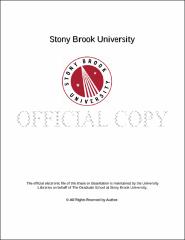| dc.identifier.uri | http://hdl.handle.net/11401/77583 | |
| dc.description.sponsorship | This work is sponsored by the Stony Brook University Graduate School in compliance with the requirements for completion of degree. | en_US |
| dc.format | Monograph | |
| dc.format.medium | Electronic Resource | en_US |
| dc.language.iso | en_US | |
| dc.publisher | The Graduate School, Stony Brook University: Stony Brook, NY. | |
| dc.type | Dissertation | |
| dcterms.abstract | Abstract of the Dissertation American Literary Regionalism and the Sister Arts: Local Color Outside the Lines by Brandi So Doctor of Philosophy in English Stony Brook University 2015 American literary regionalism was partitioned off from literary realism in a manner that marginalized a movement dominated by women. The gendering of the genre stems in part from the unprecedented integration of women authors into the mainstream market. Conversely, the masculinization of literary ekphrasis still actively shapes its relative discourse. Traditional characterizations of ekphrasis imagine a masculine and aggressive act upon a disempowered, voiceless, feminized object. The timbre of this conversation is often sexual in its connotation, and relies on a theory of art epitomized by the female nude. This dissertation argues that ekphrasis is a formal trait of literary regionalism in that the genre recapitulates the visual impression of an author who found that impression artistically significant. I argue that regionalism and ekphrasis share a theoretical similarity that opens fruitful cross-interrogations. Holding that analyses of regionalist literature benefit from the theoretical lenses commonly applied to literary ekphrasis, I show that the visual roots of American literary regionalism run as deep as American history itself. My work pursues the interpretations made possible by these ekphrastic associations. In a chapter about Sarah Orne Jewett and Charlotte Perkins Gilman’s watercolor paintings, I find in Jewett a dialectization of the Victorian-era “language of flowers†that critiques the social restraints plaguing women’s spiritual and reproductive health. In Gilman, a startling alternative reading, one of conversion and transcendence, emerges in “The Yellow Wall-paper†(1892) by applying the formal tenets of the artistic arabesque to the structure of her literary arabesque. The next chapter focuses on the epiphanic ekphraseis of modernist Willa Cather, which integrate her sense of region with her background as a theatre, opera, and art critic. In the closing chapter, I show how the works of Southern literary regionalists Eudora Welty and Flannery O’Connor both advance themes of “double vision†that emerge most clearly in their paintings. In analyzing ekphraseis outside of overly-simple traditions, that is, considering female authors who deploy ekphraseis of their own art, I show that such representations constitute a double voicing of the authorial self, rather than the masculinist appropriation of a feminized ‘other.’ | |
| dcterms.available | 2017-09-20T16:52:56Z | |
| dcterms.contributor | Haralson, Eric | en_US |
| dcterms.contributor | Newman, Andrew | en_US |
| dcterms.contributor | Scheckel, Susan | en_US |
| dcterms.contributor | Pryse, Marjorie. | en_US |
| dcterms.creator | So, Brandi Dawn | |
| dcterms.dateAccepted | 2017-09-20T16:52:56Z | |
| dcterms.dateSubmitted | 2017-09-20T16:52:56Z | |
| dcterms.description | Department of English. | en_US |
| dcterms.extent | 288 pg. | en_US |
| dcterms.format | Monograph | |
| dcterms.format | Application/PDF | en_US |
| dcterms.identifier | http://hdl.handle.net/11401/77583 | |
| dcterms.issued | 2015-12-01 | |
| dcterms.language | en_US | |
| dcterms.provenance | Made available in DSpace on 2017-09-20T16:52:56Z (GMT). No. of bitstreams: 1
So_grad.sunysb_0771E_12347.pdf: 25206776 bytes, checksum: 64b115558bbc68c2c89fdae44ca6d3a2 (MD5)
Previous issue date: 1 | en |
| dcterms.publisher | The Graduate School, Stony Brook University: Stony Brook, NY. | |
| dcterms.subject | Literature | |
| dcterms.subject | Archive, Art, Ekphrasis, Gender Studies, Literary Regionalism, Women's Studies | |
| dcterms.title | American Literary Regionalism and the Sister Arts: Local Color Outside the Lines | |
| dcterms.type | Dissertation | |

